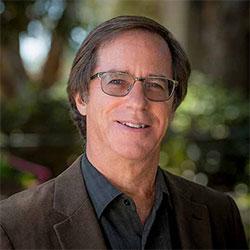
Keith Pezzoli, Ph.D.

- Project Description
- Community Partners
- Profile
Project Description
“We [Pezzoli, Lewis, and Rabinowitz-Bussell] propose two projects, one an evaluation of an existing and highly-successful two-quarter practicum course series (Life Course Scholars Program), and two, the development of a new two-quarter, experiential learning course series called Urban Challenges: Homelessness in San Diego. The Life Course Scholars (LCS) Program is an interdisciplinary, cross-generational, multi-site learning experience for college students and older adults. It combines place-based, experiential, and traditional classroom-based learning methods, regular exchanges with Elder Partners (EPs) in the community, and other collaborative activities. The LCS Program was developed and is taught by Drs. Lewis and Rabinowitz . The aims of the LCS Program are to:
- Increase individual knowledge and competency around healthy aging, broaden perspectives about people’s lives in their later years, and cultivate critical awareness about policies and structures that create disproportionate negative impacts on particular individuals and communities across the lifespan.
- Effect a transformative shift in how students view the older generation, with an increase in empathy, understanding and respect for the elders with whom they form relationships, and, by extension, toward seniors from all walks of life. At the same time, we hope that Elder Partners who interact with students through the program will overcome their own presumptions about younger adults, and feel a greater connection to this generation.
- Positively affect students’ and elders’ individual health behaviors and outlook, their interest and engagement with public discourse around issues and policies affecting all of our lives across the life course, and their knowledge of planning, design, health, communication, and related strategies to create vibrant lives and livable, all-ages friendly communities for all.
- Increase the likelihood that students will work with, or on behalf of, older adults in their careers or avocations
Thus far, 52 Life Course Scholars have completed the program, and 25 more will finish this June. Each fills out baseline, midway, and follow-up surveys, which include both scale measures and personal reflections on changes and learning they perceived in themselves. This has yielded valuable information about the immediate impacts on students. All (100%) respondents report that their knowledge increased as a result of their participation in the LCS Program in all of the following areas:
- Biological, sociocultural, psychological and demographic issues related to
aging
- What it is like to be an older person in the U.S. today
- Structural determinants of health and life
- Current knowledge of communities and populations in San Diego
With this Changemaker Faculty Fellowship, we would like to create a more robust evaluation with two new components. First, we would like to include a control group of students (matched for majors, demographics, etc) against which to compare the changes we have seen in the first four cohorts. Second, we would like to create a mechanism to track LCS’ers (yearly) over time to be able to assess long-term (alongside the short-term) impacts on knowledge, sense of connection, attitudes, behavior, well-being, and career trajectory.
The second part of our proposal is to start from scratch and develop a new two-quarter CESL practicum (Urban Challenges: Homelessness in San Diego) which provides opportunities for students to learn in-depth about a significant social challenge (in this case, homelessness). Our aim is to take students out into the San Diego community to meet, speak with, and conduct research among people who are unhoused. We will take the students out into the community to learn about the demographics, the hard realities, the servicescape and the humanscape of homelessness in San Diego. The students will meet and interact with a broad range of individuals grappling with the crisis of homelessness, including families, veterans, LGBTQ youth, and transitional age youth (TAY), 18-24 year olds who have aged out of the foster care system. This new CESL program is being developed by all three of us and will be taught by Drs. Lewis and Rabinowitz Bussell.
We envision training students in qualitative research methods (primarily oral history interviewing and focus groups), including both data collection and analysis. Our aim is to involve students in learning, research and action that has a positive impact on people’s lives via program improvement, policy advocacy and simple human connection. This project will be done in collaboration with Jewish Family Service of San Diego. JFS operates the Safe Parking Program for homeless individuals who live out of their cars and need a safe place to park in the evenings. JFS approached us to conduct a longitudinal qualitative and quantitative evaluation of SPP and we proposed the inclusion of the two-quarter practicum sequence for 25 undergraduate students. JFS embraced this proposal. When we put out the call for prospective students to enroll in the course, we received tremendous interest and had to cap the class at 25 students in order to maintain the type of close learning community that we know is vital to the success of CESL endeavors such as this.
Based on our experience with the LCS Program, we anticipate that the Urban Challenges practicum will have a transformative impact on the students. We will build in a robust evaluation of student learning outcomes, as well as outcomes related to change in attitudes, perspective and behavior. We received donor funding (Mark Gleiberman, a member of UC San Diego’s Board of Trustees) to support the first year of the program with a strong indication that a second year of funding will also be available to us to teach the course a second time.”
Community Partners
Gary and Mary West Senior Wellness Center, Casa de Manana, Bayside Community Center, San Diego County Office of Aging and Independent Services, LGBT Community Center, Jewish Family Service, Father Joe’s Village and Urban Angels